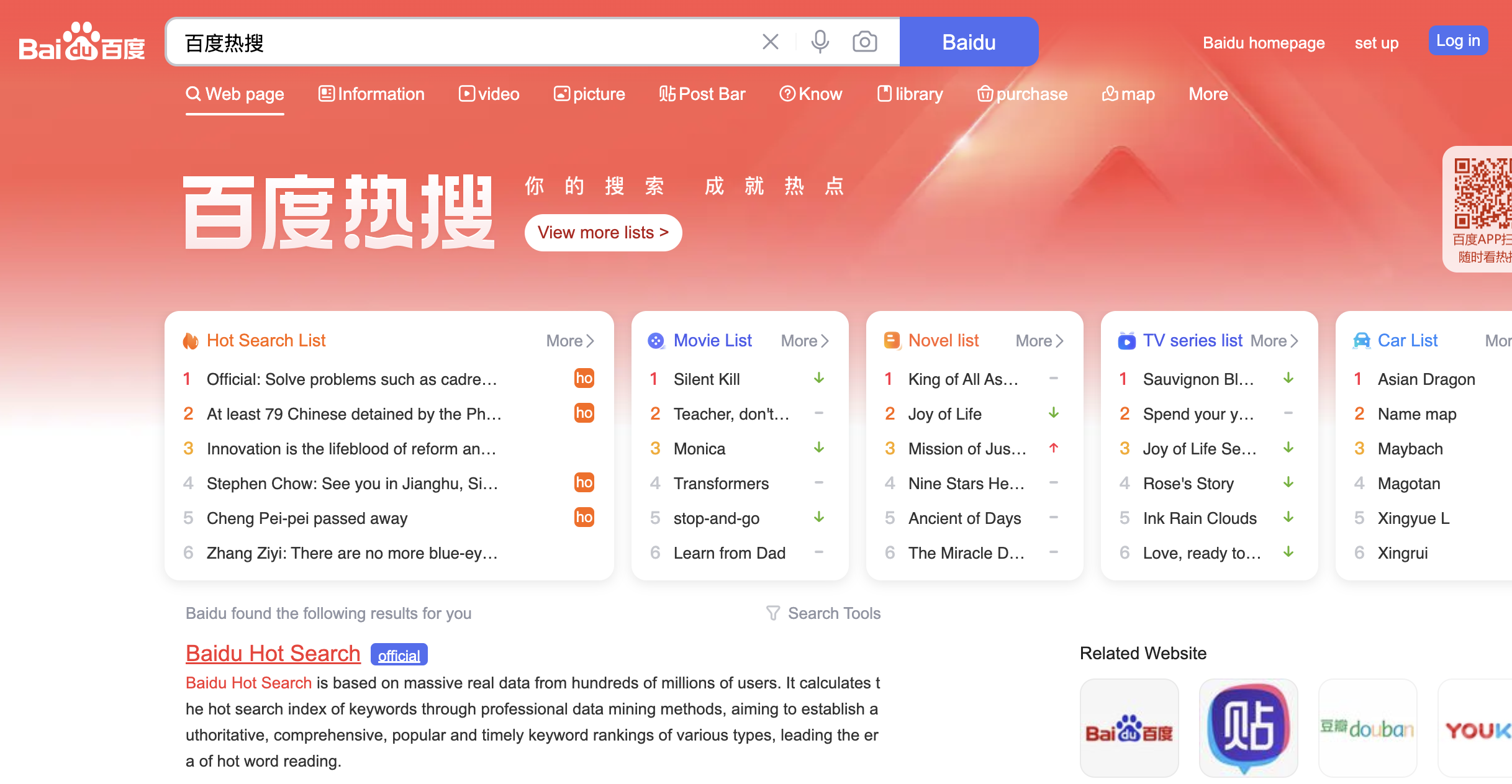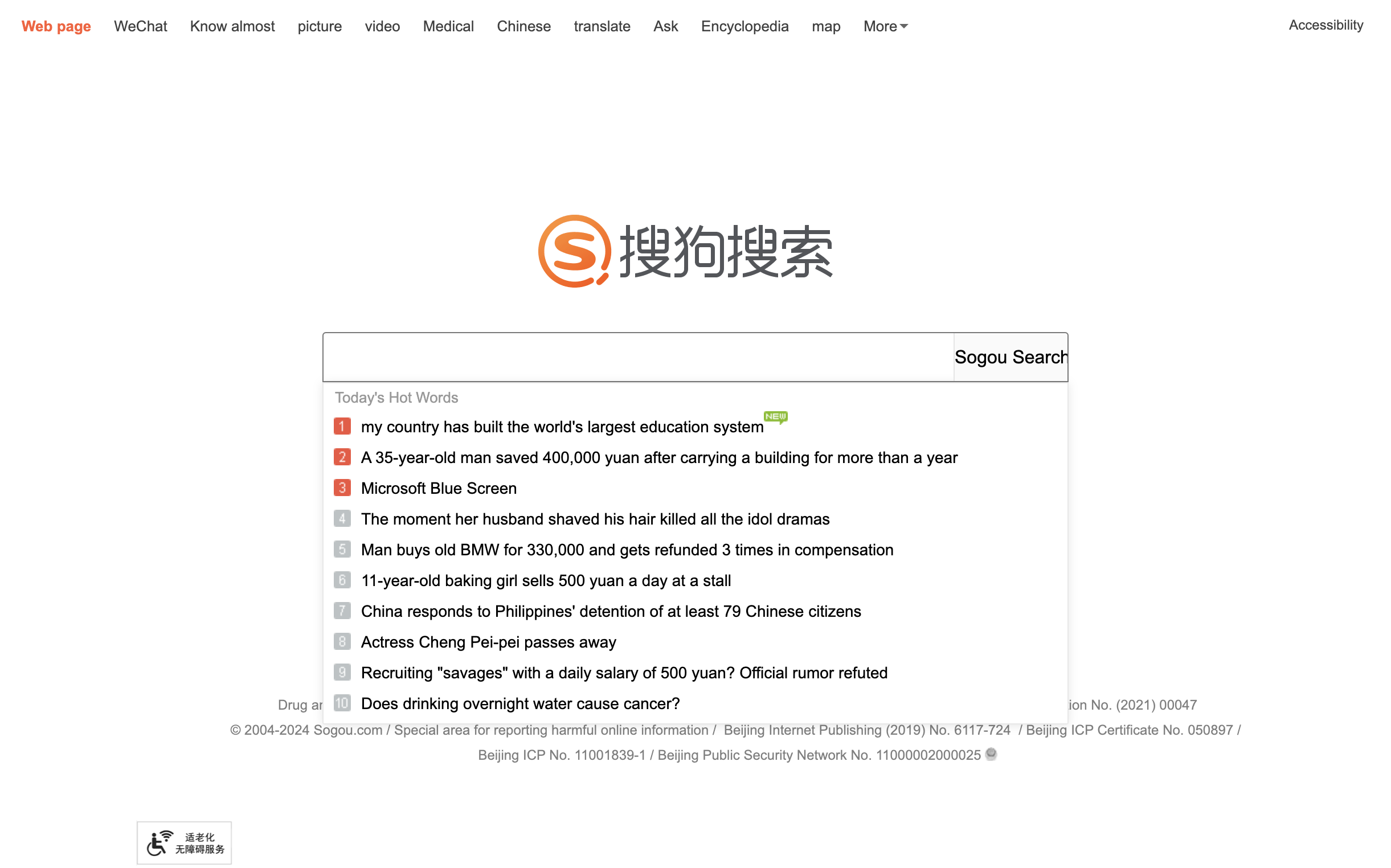In 2021, China surpassed one billion internet users, making it the biggest online market in the world.
But as global businesses seek to gain a foothold in this rapidly growing digital economy, they face a unique set of challenges, including optimizing their websites for the world’s most populous nation.
Unlike in the rest of the world, where Google is the undisputed king of search engines, it went down from 3.56% in June 2022 to just 2% of the Chinese market in July 2024.
Bing, its main global competitor, fared slightly better, with an 11.47% market share.
However Chinese internet users still need a means of finding products and information on the web.
If they’re not using the search engines popular in the rest of the world, what are they using?
Domestic search engines, designed in China for use in China, of course.
To help you enter the Chinese online market or attract new customers from the East, this piece will cover the top five search engines in the People’s Republic of China (PRC) and give you tips for using them to reach your goals.
But before we get to that, it’s important to get some background information.
The Internet And Censorship In China
Though it has supported simplified and traditional Chinese searches since 2000, Google did not officially join the Chinese mainland market until 2006.
At this time, the country had just 137 million internet users.
Just four years later, the search engine giant abandoned the country in favor of Hong Kong to avoid Chinese censors.
In response, the Chinese government banned Google search sites in all languages.
This was all set in motion by an internet explosion in 2009.
Worried about the impacts of unrestricted access to information, the Chinese Ministry of Industry and Information Technology issued the Circular on Computer Pre-Loaded Green Internet Filter Software.
This required a web filter on all devices made or sold in China to block access to certain sites, including news, streaming, and social media sites, among others. More sites are added to this list every year and if you’re worried your domain is included, you can check here.
But where there’s a will, there’s always a way, and enterprising and tech-savvy Chinese citizens have turned to use virtual private networks (VPNs) to access restricted sites.
Surprisingly, while there are numerous VPNs on the list of blocked sites, their use is not illegal.
And while this workaround exists, it’s simply not a significant means of driving traffic to Western sites from the Asian country.
Google To Return To China?
It’s hard to imagine the world’s biggest search engine would completely forgo the world’s biggest online market and there have been hints it intends to return at some point.
In a 2018 letter obtained by the New York Times, hundreds of Google employees signed a letter objecting to working on a censored Chinese version of the search engine, which was being built in secret.
However, just one year later, Karan Bhatia, a vice president of government affairs and public policy at Google testified before a Senate Judiciary Committee that the project had been terminated.
But that hasn’t silenced murmuring that the company plans to get back into the Chinese market. If it does, it will be in for stiff competition from homegrown search engines that are already well-entrenched.
But more on that in a bit.
First, let’s talk about how the Chinese online marketplace and the Asian giant’s unique customer journey.
How Chinese Consumers Shop Online
The first thing every ecommerce company that wants to do business in China needs to understand is that the way Chinese consumers use the internet is very different from what most non-Chinese companies are used to.
For one thing, while mobile internet surpasses usage on computers in most countries, it does not dominate search traffic in the way it does in China.
In 2020, almost every Chinese internet user (99.9%) accessed the web via their smartphone.
By comparison, 32.8% accessed the internet via desktop and only 28.2% on laptop computers. Thus, any company entering the online marketplace in the country would be wise to focus its efforts on the mobile market.
Chinese consumers also rarely visit company or brand websites, preferring instead single-entry points where numerous brands are represented. Instead of searching for specific products, they tend to perform extensive research and read (often automated) recommendations before making a purchase.
Social media and influencers also have a strong influence on purchasing decisions.
On- and off-line sales channels tend to be more integrated with the PRC, while the line between entertainment and shopping is fuzzy.
Chinese users can often click on items they like in social media posts and buy them in a linked online store.
Additionally, Chinese merchants place an emphasis on customer service, which contributes to high levels of purchasing loyalty.
What Search Engines Is China Using?
While cultural differences exist from country to country, and sometimes region to region everywhere in the world, Chinese norms are often quite unfamiliar to Western companies. And that includes the search engines used.
So, what sites are the Chinese using to find things on the internet? Here are the top five:
1. Baidu – China’s Answer To Google
 Screenshot from Baidu, July 2024
Screenshot from Baidu, July 2024Much like “to Google” has become a standard verb meaning to look something up online, in China people “Baidu” something.
It controls more than 50% of the search engine market in the PRC and even brings in some users from other countries, including the U.S. and Japan.
Baidu got its start with funding from Silicon Valley in 2000, initially as just a homepage that allowed companies to bid on ad space. Since then, it has expanded not just into search, but also artificial intelligence and a number of internet-related products and services.
What You Need To Know
Baidu only indexes sites that use simplified Chinese characters.
That means if you don’t have a Mandarin website, you won’t show up.
It also prefers websites that are hosted on Chinese servers.
To host a website in the PRC, you must have an Internet Content Provider License.
Search engine position is determined by homepage and Baidu’s rankings still include meta keywords, partially due to image AI that is not as advanced as Google’s.
That means image alt texts and metadata are important to ensuring its image understanding.
HTTPS is also included as a ranking signal and it seems to take loading speed, content quality, and content prominence into account as well.
It’s also important to note that Baidu does not handle JavaScript well, so all content and links should be in plain HTML on both mobile and desktop versions of your site.
2. Haosuo – Secure Search
 Screenshot from Haosou, July 2024
Screenshot from Haosou, July 2024Also known as Qihoo 360 Search and so.com, Haosuo comes in at #3 in the Chinese domestic search engine market. Launched in 2012, it went through a series of domain changes, operating as so.360.cn, so.com, and haosou.com.
Backed by one of China’s largest internet providers (Qihoo 360), it became Haosuo in 2016.
This change came with a simplified interface and an increased focus on mobile experiences.
What You Need To Know
The Qihoo 360 browser comes preinstalled on most Chinese computers, making it the Internet Explorer of China. No word on whether it’s used primarily by technologically challenged seniors, though.
Known for its security features, any Chinese businesses recommend their employees use Haosuo, making it a powerful player in B2B marketing.
Also, this cybersecurity emphasis appears to be reflected in rankings, with sites with higher authority and trustworthiness seeming to be ranked higher.
There is less competition on 360 Search, which often means a lower cost-per-click on paid ads.
A unit based in Hong Kong may also make it easier for foreign companies to advertise on this platform.
3. Sogou – Search-Dog
 Screenshot from Soguo – Search Dog, July 2024
Screenshot from Soguo – Search Dog, July 2024Initially launched in 2004, Sogou (literally “search dog”) holds the second spot in the domestic Chinese search market, claiming a 4.83% share.
In September 2021, it completed a $3.5 billion merger to become a subsidiary of Tencent, a technology company with gaming, social media, and entertainment interests.
What You Need To Know
Sogou’s search algorithm places a high value on original content and site authority.
Like Baidu, it favors websites that use simplified Chinese and those hosted on Chinese servers.
Backlinks are an important ranking factor, with the emphasis seemingly on quantity rather than quality. Meta descriptions don’t seem to be as important, but title tags are vital.
Because of its connection to Tencent, Sogou is the default search engine for QQ Browser, QQ Messenger, and WeChat, all major apps in the Chinese market.
4. Shenma – The First Name In Mobile
 Screenshot from m.sm.cn, July 2024
Screenshot from m.sm.cn, July 2024A venture between ecommerce giant Alibaba and UC Web, Shenma claims 1.74% of the Chinese market.
It is the default search engine on the UC web browser, which is one of the most used browsers.
What differentiates Shenma from the competition, and most search engines for that matter is that it is mobile-only.
Calling itself the “experts in mobile search,” Shenma is a combination search engine and app store.
What You Need To Know
Shenma’s link with Alibaba allows it to include direct links to product pages.
It’s widely used for home goods, clothing, and books, as well as apps.
Products that are listed on Taobao or Tmall (Alibaba shopping properties) are given priority, which improves placement in search results.
5. Youdao – The Translation Search Engine
 Screenshot from Youdao, July 2024
Screenshot from Youdao, July 2024A division of Chinese internet technology company NetEase, Youdao operates more like an online education platform than a traditional search engine.
It allows users to search websites, images, news, and perhaps most importantly to foreign users, Chinese-to-English entries.
What You Need To Know
Youdao can translate Mandarin into more than 20 languages.
It is the biggest translation tool and online dictionary in the PRC, providing example sentences and word usage help.
More than half of Youdao’s users are 24 or younger.
Primarily used by students and high-income individuals, it offers opportunities for foreign companies looking to sell international products in China.
Getting Started In SEO In China
Getting a foot in the door in China’s search engine rankings can be tricky.
And if you don’t have a site in Mandarin, preferably hosted within the PRC, it can be very tough.
But in a country of more than 1 billion internet users, it’s worth the effort.
Baidu is the big dog on the block, but it doesn’t dominate the Chinese market in the same way Google dominates the American one.
Competitors are finding new ways to carve out their own niches.
And this provides opportunities for international companies.
International SEO requires some extra work, but by doing your research, becoming familiar with Chinese search habits, and working within the confines of the PRC’s internet environment, you can claim your spot in the rankings and expand into new markets.
More resources:
- Can Pro-Privacy Search Engines Replace Google?
- 4 Important Business Benefits Of An International SEO Strategy
- Getting Started In International SEO: A Quick Reference Guide
- 23 Great Search Engines You Can Use Instead Of Google
Featured Image: Shayli/Shutterstock





